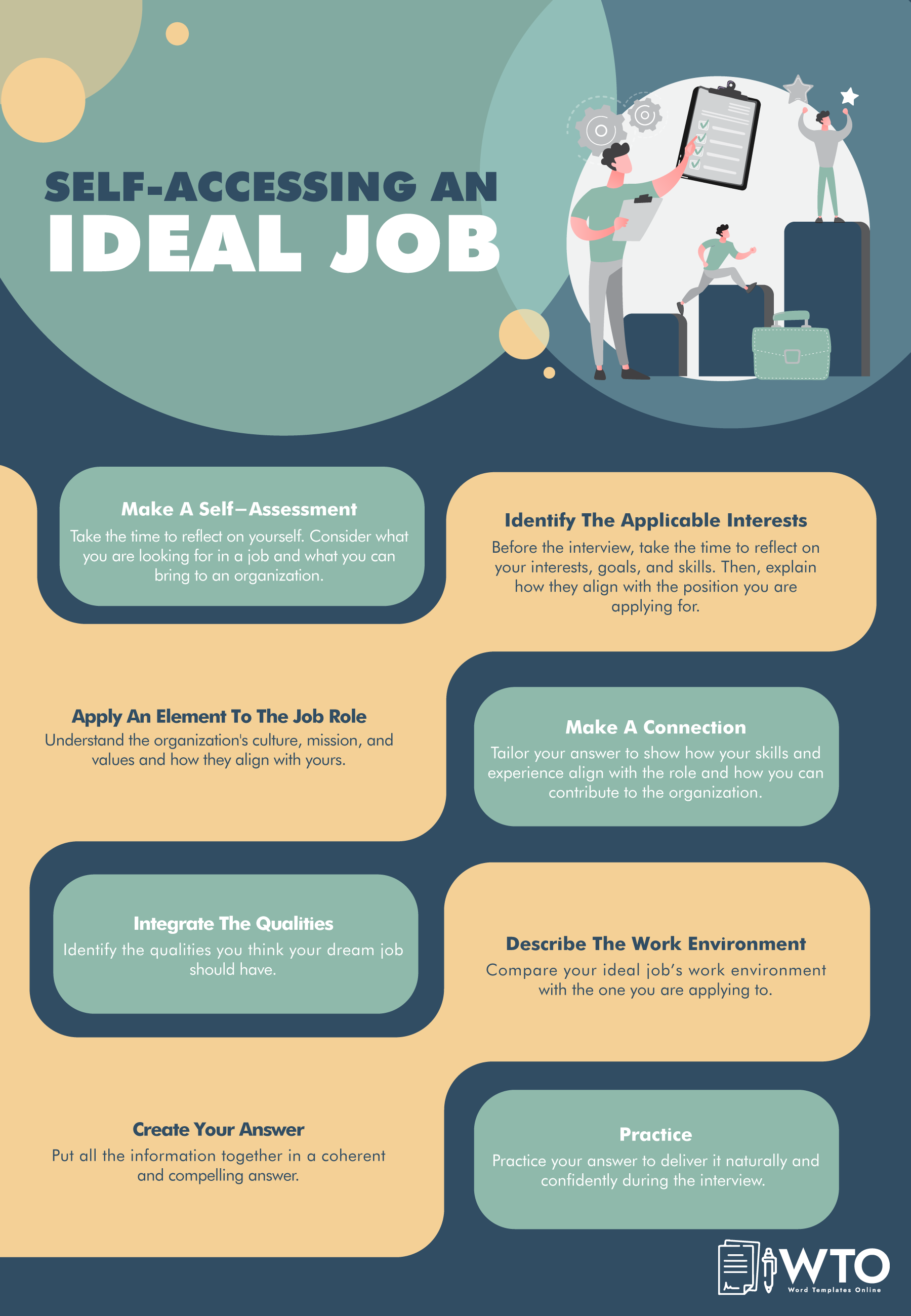The definition of a perfect career is personal and varies among different people. Some look for happiness and satisfaction, while others look for financial stability. Satisfaction with one’s career is essential because it allows you to enjoy using your talents and skills to achieve your professional goals while at the same time benefiting your employer because they will receive high levels of productivity from you. Eventually, your answer to this question should balance your needs and the interviewer’s objective, which is why interviewers often ask this question, “What does an ideal job mean for you?
This article will help the readers understand how to approach this question satisfactorily for the interviewer. This article will also discuss why interviewers ask this question and the dos and don’ts you should consider while answering such questions.
How Workers Define Their Ideal Jobs
An ideal job should offer satisfaction and stability. While each person has different standards and requirements for their career choice, some factors remain constant among American workers, with pay being the most common. Other factors include flexibility, opportunity, meaning, and security.
In addition, some workers value work that allows them to express their creativity and talents, while others prefer intellectual freedom.
Characteristics of Ideal Job
Even though everyone’s idea of the perfect job is different, there are some characteristics that everyone agrees are crucial.
They include:
Opportunities for growth
An ideal career should offer good opportunities for professional growth. It means that the worker can get more experience, money, and control over their careers. Workers with no control over their progress often feel unfulfilled and unmotivated, resulting in dissatisfaction with their work.
On the other hand, workers with more control over their work and career progress have reported higher job satisfaction.
Adequate salary
Financial stability is one of the most common motivations for people to work. As such, an ideal job should provide an adequate salary for the worker. While adequate is relative, you should compare the benefits with the net pay. Some compensation packages may include a car allowance and health insurance, while others may be good but have insufficient benefits.
An inspiring boss
The role of a good boss cannot be overstated. A good boss can positively impact employees’ job satisfaction by providing clear direction and guidance, recognizing and rewarding good performance, creating a positive work environment, promoting teamwork and collaboration, and supporting professional development and growth.
Workload
Workload and demands can also impact an ideal job. Some people may prefer a higher workload or more demanding tasks, while others may prefer something with a lower workload and less pressure. The level of workload and expectations can impact whether a job is considered ideal.
EXAMPLE
Some people may prefer a fast-paced work environment with high levels of responsibility and challenges, while others may prefer a more relaxed and less demanding work environment.
The ideal workload and job demands can vary from person to person, depending on their individual preferences and work style.
Comfortable work environment
The physical work environment can also impact an ideal job. The physical work environment includes the workspace, lighting, noise levels, temperature, and office design. The physical environment can have a significant impact on satisfaction, productivity, and overall well-being.
EXAMPLE
An ideal job for someone may include a well-lit workspace with comfortable temperatures, minimal noise levels, and ergonomic office furniture.
A well-designed office can also promote collaboration and creativity among team members, which can contribute to an ideal job. The physical work environment is an important factor to consider when looking for an ideal job, as it can impact both physical and mental health, satisfaction, and overall productivity.
A sense of purpose
Feeling that one’s work has a meaningful impact on the world or society can also impact an ideal job. Many people want their work to have a positive impact on the world or society, and finding work that allows them to make a difference can be an essential factor in job satisfaction.
EXAMPLE
Someone who wants to work in the non-profit sector may be more likely to find an ideal job in an organization that aligns with their values and makes a positive impact on the world. Similarly, someone who is passionate about the environment may seek work at a company that promotes sustainable practices.
Having a sense of purpose and meaning in one’s work can lead to greater job satisfaction, increased motivation, and a sense of fulfillment.
Flexibility and autonomy
According to U.S. News and World Report, most workers believe having flexible working hours and work-from-home programs creates an ideal work environment. Flexibility is about having control over work hours, places, and how you work. The level of independence and control over one’s work can affect job satisfaction, motivation, and performance.
For some people, having a high level of autonomy and control over their work can be an essential factor. Autonomy and control can also influence how individuals approach their work, with those who have more control over their work being more likely to take ownership and be more innovative. Overall, the level of autonomy and control is an important factor to consider when looking for an ideal job.
Job security
Job security is an essential factor that can impact satisfaction. People who value security may prioritize finding a stable and secure job with a low risk of layoffs or losses.
Excellent work-life balance
An ideal career allows the worker to have a healthy work-life balance. A healthy work environment is one in which employees do not sacrifice their social lives or other obligations to perform their work duties. In addition, a healthy work-life balance is necessary for people with families and young children.

Why Employers Ask What Ideal Job Means to You: Understanding the Motivation Behind Question
Employers frequently inquire during interviews about your definition of the ideal position. The question is one of the ways they will gauge your suitability for the position and the workplace. Therefore, it is essential to answer this question correctly to show that you would be a good candidate.
To answer this question, you need to understand its basis and how to approach it when it is asked. Here is an explanation of why employers ask this question and how to prepare an answer to it before the interview.
Employers need to assess whether you are suitable for a position; further, when asking this question, they want to see whether your expectations, skills, and goals align with your responsibilities. The interviewer also assesses your personality and passions to establish how to relate to and motivate you. You are not expected to give a specific answer to this question.
However, the interviewer expects you to show how your skills and goals align with the duties you are to fulfill in your job. There should be an overlap between your skills and the work itself.
How can this question be phrased differently?
While some interviewers may ask you, “What is your ideal job?” others may ask this question in alternative ways, as given below, to understand specific needs or learn about particular qualities of the applicant.
- What work would you do if you did not need a salary?
- What do you like most about your work?
- What is your dream job?
- What one job would you do for the rest of your life?
How to Prepare Answer Before Interview
To answer this question effectively, you must prepare your answer before your interview. Good preparation ensures you approach the question correctly, in whatever form it is asked.
The following steps can help you prepare an effective answer to such questions:
Make a self-assessment
A self-assessment involves comparing your passions, skills, and expectations with your ideal career. Your lifestyle, future financial plans, and family planning will determine your answer. You need to identify what you are passionate about; this will help you understand what career you should follow to gain personal satisfaction while also aligning with your preferred abilities.
EXAMPLE
If you have difficulties with math, you should avoid an accounting career. While you may want to fulfill your passions, you should consider your financial situation and whether you can study while working or whether you will need financial support.
Your self-evaluation should take into account the possibility that you occasionally prefer to work from home or have a position that permits travel.
Research the job and the company
Look into the company you are applying for and the position you are interviewing for. Consider how the work aligns with your career goals and whether it would be a good fit for you. Once you have a clear understanding of the company’s goals and values, you can then assess whether the work aligns with your career goals and aspirations.
Consider how the responsibilities, work environment, and opportunities for growth and development match your skills and interests.
By doing this research, you can ensure that your answer to the question is specific and tailored to the company and position you are applying for. This shows the interviewer that you have a genuine interest in the company and have thought carefully about how you can contribute to its success.
Reflect on your career goals
Reflecting on your career goals is another important step in preparing an answer to the ideal job question. This involves taking some time to consider what you want to achieve in your career and what type of work would help you achieve those goals. By doing so, you can gain a better understanding of what you are looking for and how it aligns with your long-term aspirations.
It is also important to consider what motivates you and what you enjoy doing in a work setting. If you can align your career goals with your interests and passions, you are more likely to find work that is fulfilling and enjoyable. This will help you identify what you are looking for in a career and how you can communicate this to the interviewer.
Integrate the qualities
If you cannot tell exactly what your ideal job should be, identify the qualities you think it should have. Does the position you are applying for have these qualities? Qualities may include things like working in sales positions, working directly with customers, or working with a team.
Think about the work culture
When preparing your answer, it is also important to consider the company’s culture and values. Research the company’s mission statement, vision, and values to gain insight into the organization’s culture. Consider how the company operates and what it values in its employees. Think about how your values align with those of the company and how you can contribute to the company’s culture.
EXAMPLE
If the company values teamwork and collaboration, you can discuss how you enjoy working in a team and have contributed to successful team projects in the past. If the company values innovation and creativity, you can discuss how you enjoy generating new ideas and have implemented innovative solutions in your previous roles.
Showing that you understand the company’s culture and values and how you can contribute to them can demonstrate to the interviewer that you are a suitable candidate for the company.
Create your answer
Now that you know your dream job, skill set, and qualifications and have a connection with the work you seek, you need to create your answer to express this connection. Your answer should show this connection clearly.
Practice your answer as often as possible to make it look natural. A clear and thoughtful response gives the impression of preparedness, which most interviewers appreciate. Cramming, on the other hand, will be disadvantageous to you in an interview because you will not be able to process the question and give an honest answer.
Examples
You can use the following as examples of how to respond to the question about an ideal job in an interview:
Why are you interested in this job?
That is a good question. I applied for this position because it allows me to work with leading innovators in the technology sector. In addition, I believe my expertise can be employed to make a difference in people’s lives.
What is your ideal work environment?
My ideal job would involve working with a team of innovative people who are respectful and accountable to each other. I value good interpersonal relationships because they motivate me to work well, and working in an environment of mutual respect is fulfilling.
What do you look for in an ideal job?
My ideal job would be in a flexible and challenging environment that promotes my growth and career advancement. I enjoy tackling new challenges because they are opportunities for growth and experience.
I seek a career that will enable me to use my skills to positively impact people’s lives. It should provide an opportunity to work in an environment where I can make a difference in the lives of my colleagues and the surrounding community.
What abilities would you use in your ideal position?
I would employ my excellent customer skills to deliver the best services to my company’s client base and boost productivity, as this would give me the satisfaction I hope to get in my preferred career.
Do’s and Don’ts
When answering questions regarding your ideal job, there are some acceptable and unacceptable things you need to consider:
Do’s
- Highlight the strengths and skills that align with the job description.
- Answer in a way that is relevant to the position and the company’s values.
- Discuss specific aspects of the industry that interest you.
- Illustrate how you used your skills to approach an issue.
- Link the opportunities provided by the job to your professional aspirations.
Don’ts
- Lying about the position being your ideal one.
- Make a long-term goal that is not related to the career you seek.
- Avoid repeating the job description in your answer. Instead, relate your skill set to the duties you will need to perform in the position.
- Avoid making unnecessary hand gestures or showing signs of anxiety. Even if you are nervous, be calm when speaking.
Final Thoughts
In conclusion, an ideal job should bring you satisfaction and fulfillment while catering to your financial needs and future aspirations. Consider various factors when answering the question, “What is your ideal job?”. Before you answer this question, you need to understand that the interviewer is assessing certain aspects of your character and whether you will be suitable for the job. As a result, you must be prepared to respond appropriately to this question. Proper preparation involves identifying your ideal career and practicing your answer. Your answer should be brief, honest, and natural.




